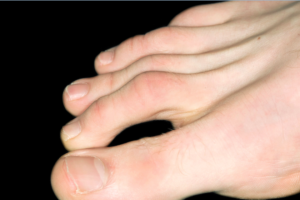A hammertoe, claw toe and mallet toe is a foot deformity in which a toe has an abnormal bend in its middle joint and points downwards thus giving it the hammertoe name. It can be an extremely painful and uncomfortable condition for some. Often, a callus or corn will form on top of the toe is due to consistent rubbing against the inside of shoes.
Hammertoes form when there is an imbalance in the surrounding muscles, tendons, or ligaments that normally keep the toe
straight. The pressure from the imbalance causes the toes to become misshapen and point upward at the joint which forces the toe to become bent rather than flat.

Why does it happen?
Hammertoe is a rather common condition and women are much more likely to develop it, mainly due to the shoes
they wear. Here are some examples of causes and risk factors hammertoe have been linked to:
- Shoes: It’s no secret that tight, high heeled and ill-fitting shoes are the culprit in many foot problems and
hammertoe is no exception. Because ill-fitting shoes do not allow your toes to lay flat so they sit in a crowded
and curled position. Over time, even when not wearing the shoes they will proceed to remain bent.
- Certain diseases: Conditions like
arthritis, diabetes and other neuromuscular diseases will have a high-risk
factor of developing hammertoe.
- Imbalance
or trauma: Toe instability or the trauma of breaking the toe can cause it
to disfigure and lead to hammertoe.
- Age:
The risk of hammertoe increases with age.
When hammertoe first develops the toe may remain quite flexible and active but over time it will contract and stiffen. It will become very painful, especially to walk on because of the constant rubbing against the inside of the shoes which will inevitably cause painful corns and calluses.
When to see a doctor
If your toe has any of the following:
- Soreness, redness or swollen
- Unable to straighten
- Painful when walking with shoes on
- Has an abnormal bend in the middle joint
Then it is time to see a doctor.
Although it is nothing life threatening, it will worsen over time so it’s important to get it checked and treated as soon as you notice any of the above symptoms. Hammertoe is easy and quick to diagnose just by a physical examination. An x-ray will also be performed to further evaluate the bones and joints.
Treatment will differ depending on the severity of the hammertoe. If it is caught early enough and the toes are still quite flexible and not too painful then the best recommendation may be to simply change shoes to a much better, wider fitting pair that’s not going to curl or crowd your toes. Sometimes custom made shoe in-soles may be necessary to aid with keeping your toes in the most comfortable position possible when wearing shoes.
Toe exercises and massages will also stop them from stiffening up and keeps the flexibility that stops them from bending.
Hammertoe surgery
After conservative methods have failed or the hammertoe cannot be moved then surgical intervention may be
recommended.
Corrective surgery for hammertoe and claw toe will depend on the exact problem with your toes. It may involve releasing or lengthening tendons, putting joints back into place, straightening a toe and changing the shape of a bone. It also may be necessary to fix the toes in place with wires or tiny screws.
Your doctor will talk you through in detail what will happen during surgery along with the possible risks and complications.
This article is intended to inform and give insight but not treat, diagnose or replace the advice of a doctor. Always seek medical advice with any questions regarding a medical condition.

